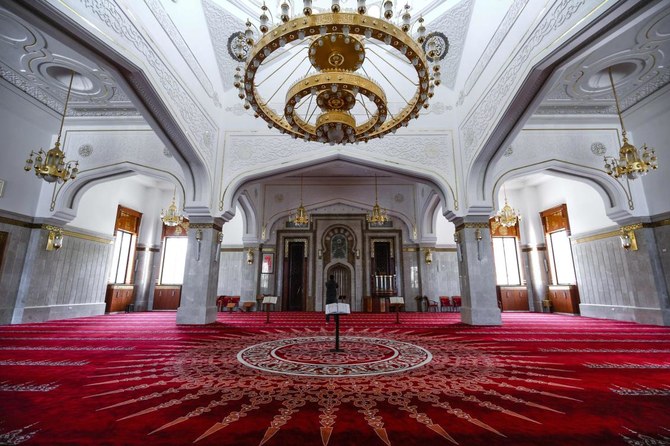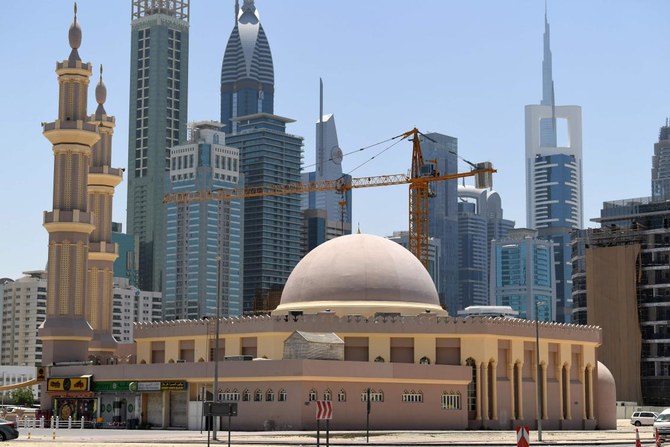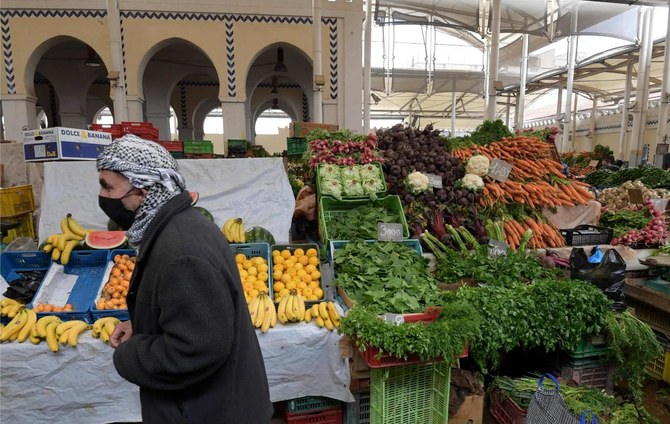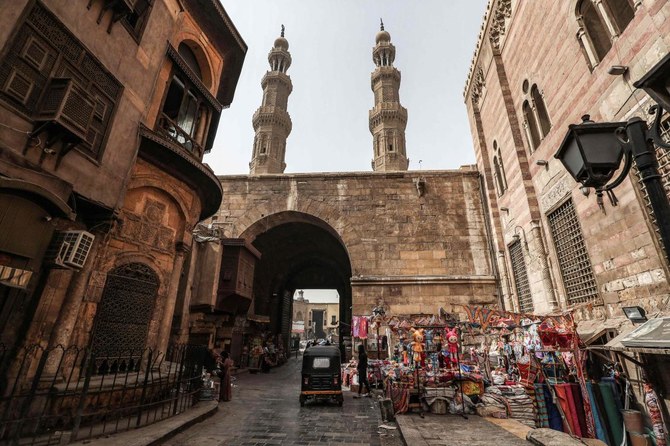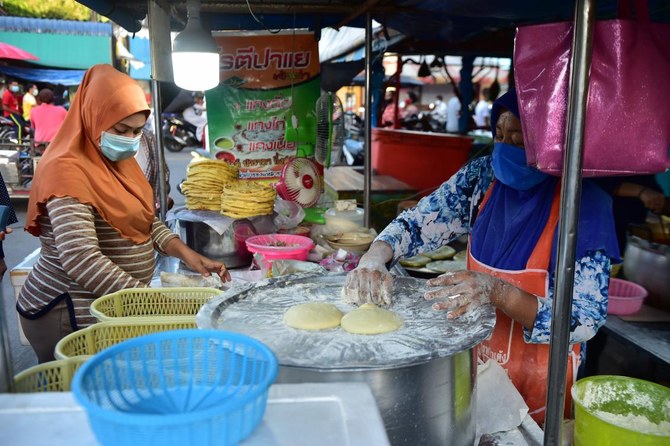JAKARTA: Muslims worldwide began Ramadan on Friday with dawn-to-dusk fasting, but many will have to forgo the communal prayers and family gatherings that make the holy month special, as authorities maintain lockdowns aimed at slowing the coronavirus pandemic.
Ramadan is usually a festive season, with the daylong fast followed by lavish meals and evening get-togethers. But this year many are confined to their homes, travel is heavily restricted and public venues like parks, malls and even mosques are shuttered.
Many are also weighed down by anxiety about the pandemic and widespread job losses resulting from the worldwide shutdowns.
“This is too sad to be remembered in history,” said Belm Febriansyah, a resident in the capital of Indonesia, the world’s most populous Muslim nation.
Jakarta is the epicenter of the outbreak in the country, which has reported more than 8,200 infections and 689 deaths. Passenger flights and rail services have been suspended, and private cars are banned from leaving the city.
Mosques in Indonesia’s deeply conservative Aceh province were packed, however, after its top clerical body ruled that it is not a “red zone” area and that prayers could continue. The province is governed by Islamic law under an autonomy agreement.
The virus causes mild to moderate symptoms in most people, who recover within a few weeks. But it is highly contagious and can cause severe illness or death, particularly in older patients or those with underlying health problems.
Muslim-majority countries began imposing widespread restrictions in mid-March, with many canceling Friday prayers and shuttering holy sites. Saudi Arabia has largely locked down Makkah and Medina and halted the year-round umrah pilgrimage.
Muslim-majority Malaysia extended its own lockdown by two more weeks to May 12, although its daily virus cases have dropped significantly in the past week. The country now has 5,603 cases, including 95 deaths.
Malaysia’s Prime Minister Muhyiddin Yassin said in a televised speech on the eve of Ramadan that the “jihad,” or holy war, against the pandemic has shown results but must continue.
Malaysia, along with neighboring Singapore and Brunei, has banned popular Ramadan bazaars, where food, drinks and clothing are sold in congested open-air markets or roadside stalls. The bazaars are a key source of income for many small traders, some of whom have shifted their businesses online.
In Pakistan, Prime Minister Imran Khan has bowed to pressure from the country’s powerful clerical establishment and allowed mosques to remain open, even as the number of new cases has recently doubled to between 600 and 700 each day. Some clerics have ordered their followers to pack into mosques, saying their faith will protect them.
Pakistan’s southern Sindh province, however, banned Ramadan prayers after the Pakistan Medical Association pleaded with authorities to close mosques nationwide.
A key element of Ramadan is charity, with the fast partly intended to cultivate empathy for the needy. But many countries have imposed bans on communal meals, forcing charities to organize home deliveries instead.
In Turkey, authorities have banned the tradition of setting up tents and outdoor tables to provide free meals to the poor. It has also forbidden drummers from going door to door to wake people up for the pre-dawn meal in exchange for tips — another Ramadan tradition.
Last month, Turkey also banned communal prayers in mosques. Health Minister Fahrettin Koca tweeted that the month of Ramadan should not be “an excuse to relax precautions.”
“The month of blessings should not result in illness,” he said.
In Istanbul, Esat Sahin, the chief imam at Fatih Mosque, said it’s a very “lonely situation.”
“Our mosques are deprived of their congregation, like a child who has been orphaned,” he said. “Our hearts are very heavy because of this.”
In war-ravaged Afghanistan, lockdowns have compounded the suffering of the poor.
“The landlord wants rent and the children ask for food, and I don’t have answers for any of them,” Ahmed Shah said as he stood outside a supermarket with a one-wheeled cart, hoping to make money by helping people with their groceries.
Ismatullah, another Kabul resident, said he and his family of five had some bread and tea before the start of the fast. “We do not have anything for tonight,” he said.
More than 1,300 people have tested positive in Afghanistan, and 43 have died.
Ramadan in India, which begins on Saturday, has been marred by the rising Islamophobia following accusations that a surge in infections was tied to a three-day meeting in March in New Delhi of an Islamic missionary group, the Tablighi Jamaat.
Some leaders of India’s ruling Hindu nationalist Bharatiya Janata Party labeled the meeting as “corona terrorism.” As a result, many Muslims have faced renewed stigma, threats and the boycotting of vendors who venture into Hindu-dominated neighborhoods.
The lockdown in India, the world’s most draconian, has multiplied their troubles.
A group of over two dozen Indian Muslim scholars have appealed to their communities to strictly follow the lockdown and pray at home. They also asked Muslims to refrain from organizing large parties held for breaking the fast and “taraweeh,” the extended evening prayers traditionally held in mosques.
“Families should use this unprecedented situation for spiritual guidance and purification,” they said, while asking local volunteers and elders to look after the needy and destitute.
India’s 200 million Muslims, 14% of the population, are the largest minority group in the Hindu-majority nation, but they are also the poorest.
Muslims begin marking a subdued Ramadan under coronavirus closures
https://arab.news/m6275
Muslims begin marking a subdued Ramadan under coronavirus closures

- Ramadan in India has been marred by rising Islamophobia
- In Pakistan, Prime Minister Imran Khan has bowed to pressure from the country’s powerful clerical establishment and allowed mosques to remain open
UK cyclists to ride 550km in Saudi Arabia to save children with heart defects

- The H&K Cycle Club was the first team to take the Hejaz route, and their endeavour has since 2022 inspired hundreds of other cyclists to follow suit
- The cyclists expect to face scorching heat, brutal headwinds, sandstorms, and long no-U-turn stretches of roads, along with physical and mental exhaustion
LONDON: A cycling team from London set out on Sunday on a 550km journey from Makkah to Madinah in Saudi Arabia to raise funds for children in developing countries with congenital heart defects.
This is the fifth year that Shamsul Abdin, the head of the H&K Cycle Club, and 40 riders aged between 18 and 65, are taking on the challenge through the Hejaz region.
Abdin told Arab News that the “Hijrah Ride” was a replication of the journey made by Prophet Muhammad over 1,400 years ago, when he migrated from Makkah to Madinah, where he established the first city-state of Islam. This migration, known as Hijrah, also marked the beginning of the Islamic Hijri calendar.
The H&K Cycle Club has expanded from just six riders 14 years ago to more than 40 members from various cities across the UK, including London, Manchester, Oxford, and Birmingham. In November, they began their training in the freezing temperatures of the UK, aiming to cycle over 100 kilometers each day within 6 to 7 hours for a 4-day ride in Saudi Arabia. On Wednesday, they are expected to arrive in Madinah.

They have cycled throughout the UK and parts of Europe, riding from London to Istanbul to raise funds for various causes through Muntada Aid, a charity that works on projects in developing countries and organizes the “Hijrah Ride”.
They were also the first cycling team to take the Hejaz route, and their endeavour has since inspired hundreds of other cyclists to follow suit. Abdin has seen Saudi Arabia become more bike-friendly over the past five years, with cycling lanes integrated into city development, while drivers, locals, and authorities are now more aware of cyclists on the roads.
The cyclists expect to face scorching heat, brutal headwinds, sandstorms, and long no-U-turn stretches of roads, along with physical and mental exhaustion. For many riders, this will be their fifth ride in Hejaz. Some of them include Uber and bus drivers, business analysts, and even entrepreneurs, according to Abdin.
“The headwind feels like climbing a mountain; it’s a constant resistance. To overcome this challenge, we ride in a peloton, taking turns at the front. One person heads into the wind while the others line up behind, shielded from the gusts. After a while, we rotate, allowing everyone a chance to lead,” Abdin explained.
Almost £923,000 has been raised by the “Hijrah Ride” since its inception, to reach a target of one million pounds this year. Some of the money went into emergency aid programs in Gaza and Sudan. Muntada Aid aims to raise about £250,000 for its flagship project, “Little Hearts,” which will fund 150 surgeries for children with congenital heart defects in Pakistan and Bangladesh this year.
“I fell in love with this project, which gives children the opportunity to live up to their potential as adults, truly,” said Abdin, who was awarded the MBE (Member of the Order of the British Empire) in December for his contribution to charitable fundraising.

The riders will be escorted by two vehicles, one in front and one in the rear, carrying paramedics and media staff, along with food and water. They will split into two groups based on their cycling powers. Along the route, they will pass several locations, including Jeddah on the Red Sea, King Abdullah Economic City, Rabigh, Masturah, and Badr, before reaching the elevated roads of Madinah, where their journey, which started with performing Umrah in Makkah, will end.
Muntada Aid is a part of Al-Muntada Trust, which was founded in 1986 by a group of Middle Eastern students, including individuals from Qatar and Saudi Arabia, to address the famine crisis in Ethiopia. Since then, the organization has assisted children in 17 countries, including Somalia, Sudan, Chad, Kosovo, Bosnia, Bangladesh, Pakistan, Mali, and Niger. They focus on developing infrastructure in education, health, water and sanitation sectors.
Nasrun Mir, the marketing director of Muntada Aid, told Arab News that they support “Hijrah Ride” with financial backing and logistics, and that they have obtained permits through communication with the Saudi Ministry of Transport, the Ministry of Foreign Affairs, the Saudi embassy in London, and the British Consulate in Jeddah.

Mir, who is joining the journey as part of the media team this week, said that the reception in Saudi Arabia could not be friendlier.
“People offer us free food and drinks. They want to have conversations with us. They want to know what we do. In the Middle East, there is still no concept of using sports as a tool for charity. The general idea is that if I want to give money to the charity, I’ll give it to them. You don’t need to run. You don’t need to cycle,” Mir said.
In one incident, a local community prevented the riders from passing through their village unless they disembarked and sat down to eat with them. In particular sections of the road near Madinah, a Saudi police vehicle has escorted the riders for a few kilometers, he added.
“There have been incidents where people have stopped us from eating our own food during the break. They literally took our food and said, ‘No, you come to our village; you cannot eat your food. You have to have food, which we will prepare.’ This delayed ride for a couple of hours,” Mir said.


